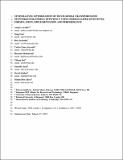System-Level Optimization of Multi-Modal Transportation Networks for Energy Efficiency using Personalized Incentives: Formulation, Implementation, and Performance
Author(s)
Sui, Yihang; Sukhin, David A.; Ben-Akiva, Moshe E
DownloadAccepted version (1.576Mb)
Open Access Policy
Open Access Policy
Creative Commons Attribution-Noncommercial-Share Alike
Terms of use
Metadata
Show full item recordAbstract
The paper presents the system optimization (SO) framework of Tripod, an integrated bi-level transportation management system aimed at maximizing energy savings of the multi-modal transportation system. From the user’s perspective, Tripod is a smartphone app, accessed before performing trips. The app proposes a series of alternatives, consisting of a combination of departure time, mode, and route. Each alternative is rewarded with an amount of tokens which the user can later redeem for goods or services. The role of SO is to compute the optimized set of tokens associated with the available alternatives to minimize the system-wide energy consumption under a limited token budget. To do so, the alternatives that guarantee the largest energy reduction must be rewarded with more tokens. SO is multi-modal, in that it considers private cars, public transit, walking, car pooling, and so forth. Moreover, it is dynamic, predictive, and personalized: the same alternative is rewarded differently, depending on the current and the predicted future condition of the network and on the individual profile. The paper presents a method to solve this complex optimization problem and describe the system architecture, the multi-modal simulation-based optimization model, and the heuristic method for the online computation of the optimized token allocation. Finally it showcases the framework with simulation results.
Date issued
2019-07Department
Massachusetts Institute of Technology. Department of Civil and Environmental EngineeringJournal
Transportation Research Record
Publisher
SAGE Publications
Citation
Araldo, Andrea et al. “System-Level Optimization of Multi-Modal Transportation Networks for Energy Efficiency using Personalized Incentives: Formulation, Implementation, and Performance” Transportation Research Record, vol. 2673, no. 12, 2019, pp. 425-438 © 2019 The Author(s)
Version: Author's final manuscript
ISSN
0361-1981
2169-4052